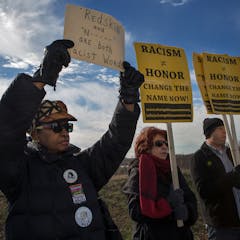
Articles on Race
Displaying 21 - 40 of 600 articles

First used in the 1970s, the social theory known as intersectionality triggered widespread debate on racial identifications and the interplay among categories.

Led by a Black businessman named Bob Douglas, the New York Rens, who played their first game on Nov. 3, 1923, became one of the best basketball teams in the country.

Student journalists are using spreadsheets and databases to examine one of the darkest chapters in American history.

Critics of the 1994 political settlement largely hail from the black middle class, even though it has been one the principal beneficiaries of South Africa’s social democracy.

A sociologist interviewed more than 200 Black workers about their experiences. Here’s what she found.

The book makes invaluable contributions to subjects of race, identity and belonging and how they shape human interrelations.

What we are already hearing today from those leading the “no” campaign is an echo chamber of Trumpist sentiments for his supporters and acolytes in Australia.

Acronyms like BIPOC can highlight the similar ways racism impacts different people. However, they can also gloss over the distinct experiences of communities.

Laura Elizabeth Woollett’s fourth novel cracks open the toxic power dynamics between a privileged huddle of ‘Blondes’ and the culturally diverse girls they seek to marginalise.

Manitoba’s provincial government has declined to support a search for three murdered Indigenous women, citing health and safety concerns. An ethicist explains why this decision needs to be rethought.

The genre has long been viewed as too exclusive, too expensive and too stuffy. Thanks to video games, that’s starting to change.

A lecturer in English literature gets her students to examine children’s books through the lens of race, class and sexuality.

Data used to train AI systems often reflects the racism inherent in society.

From immigration and federal spending to Ukraine and the state of American schools, eight GOP presidential candidates had a lot to say.

Cecilia Rabess’s controversial debut novel explores race, politics and love in the time of Trump.

Two Supreme Court rulings on the use of race appear at odds with each other. Blame Chief Justice Roberts’s ambivalence on race, a constitutional law scholar writes.

Manitoba’s refusal to fund the search for the remains of three Indigenous women is met with denouncement from the Assembly of First Nations.

Research has found that race-neutral policies were not enough to achieve diversity in Brazil’s higher education system. Three scholars probe what that means for the United States.

Some colleges grant preferential treatment in the admission process to children of alumni. A researcher examines what’s behind people’s support for the practice.

Florida Governor Ron DeSantis has declared a ‘war on woke’ in his bid for the Republican nomination for president. He’s not the first – or the last – conservative to take on progressive values.
